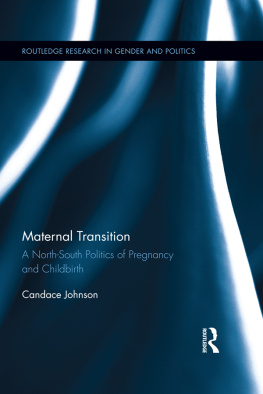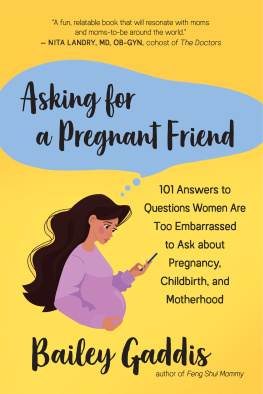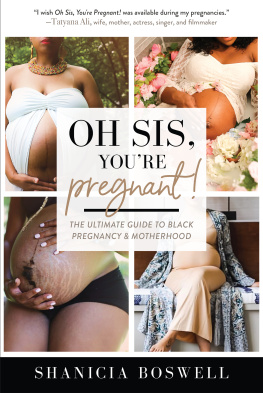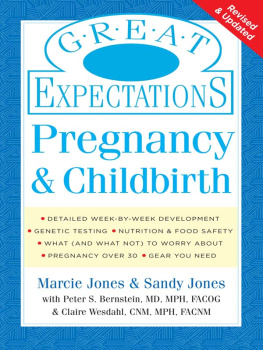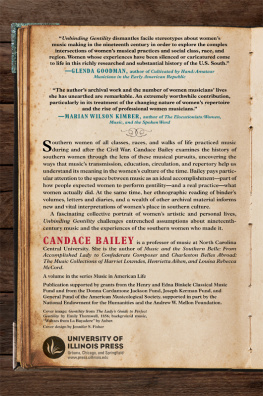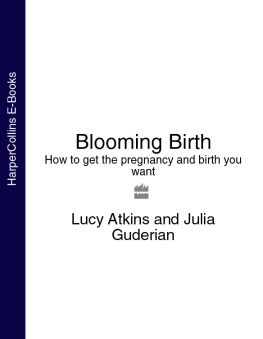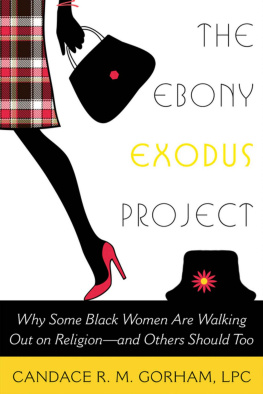This unique study comparing women from the global north and south transcends the binary model that says the medicalization of birth is either oppressive or liberating. Through cross-cultural, in-depth interviews with women from Cuba, Honduras, Canada, and the United States Johnson skillfully demonstrates how womens preferences for health care during pregnancy and childbirth are shaped by their race, class, and gender positions.
Iris Lopez, CUNY-City College, author of Matters of Choice: Puerto Rican Womens Struggle for Reproductive Freedom
Through thoughtful and sensitive interviews, Candace Johnson enables women to tell their own stories about health, reproductive decision-making and bodily agency. Incorporating feminist theories and research methods, Maternal Transition analyzes these narratives within the contexts of local history, culture and politics. Dr. Johnson examines the background assumptions in maternal health care and healthy women programs which structure the decisions women make during pregnancies and childbirths. She also documents the silences in healthy women programs regarding charged choices such as terminating a pregnancy safely and legally. Maternal Transitions should be required reading for public health, womens studies, and global politics scholars and practitioners.
Laura Woliver, University of South Carolina
Maternal Transition
What are the political dimensions that are revealed in womens preferences for health care during pregnancy and childbirth? The answers to this question vary from one community to the next, and often from one woman to the next, although the trends in the Global North and South are strikingly different.
Employing three conceptual frames: medicalization, the public/private distinction and intersectionality, Candace Johnson examines these differences through the narratives of women in Canada, the United States, Cuba, and Honduras. In Canada and the United States, women from privileged and marginalized social groups demonstrate the differences across the North-South divide, and women in Cuba and Honduras speak to the realities of severely constrained decision-making in developing countries. Each case study includes narratives drawn from in-depth interviews with women who were pregnant or who had recently had children. Johnson argues that womens expressed preferences in different contexts reveal important details about the inequality that they experience in that context, in addition to various elements of identity. Both inequality and identity are affected by the ways in which women experience the division between public and private livesthe life of the community and the life of the home and familyas well as the consequences of intersectionalitythe combinations of various sources of disadvantage and womens reactions to these, either in the form of resistance or compliance.
The rigorous and highly original cross cultural and comparative research on health, gender, poverty, and social context makes Maternal Transition an excellent contribution to global maternal health policy debates.
Candace Johnson is Associate Professor of Political Science at Guelph University, Canada. Prior to joining the University of Guelph in 2003, Professor Johnson taught at Brock University in St. Catharines Ontario and at the American University in Washington, DC. Professor Johnson has published in the areas of health care and social policy, the philosophical and political dimensions of rights and citizenship, Latin American politics and society, women and politics, and feminist theory. She has published in the Canadian Journal of Political Science, the Journal of Health Politics, Policy and Law, Polity, the Journal of Latin American and Caribbean Studies, Global Public Health and Canadian Woman Studies. She was the recipient of the 2009 Jill Vickers Prize, awarded by the Canadian Political Science Association for her work on gender and politics.
Routledge Research in Gender and Politics
1 The Womens Movement in Protest, Institutions and the Internet
Australia in transnational perspective
Sarah Maddison and Marian Sawer
2 The Politics of Gender Culture under State Socialism
An Expropriated Voice
Hana Havelkov and Libora Oates-Indruchova
3 Maternal Transition
A North-South Politics of Pregnancy and Childbirth
Candace Johnson
First published 2014
by Routledge
711 Third Avenue, New York, NY 10017
and by Routledge
2 Park Square, Milton Park, Abingdon, Oxon OX14 4RN
Routledge is an imprint of the Taylor & Francis Group, an informa business
2014 Taylor & Francis
The right of Candace Johnson to be identified as author of this work has been asserted by her in accordance with sections 77 and 78 of the Copyright, Designs and Patents Act 1988.
All rights reserved. No part of this book may be reprinted or reproduced or utilized in any form or by any electronic, mechanical, or other means, now known or hereafter invented, including photocopying and recording, or in any information storage or retrieval system, without permission in writing from the publishers.
Trademark Notice: Product or corporate names may be trademarks or registered trademarks, and are used only for identification and explanation without intent to infringe.
Library of Congress Cataloging-in-Publication Data
Johnson, Candace, 1971
Maternal transition : a North-South politics of pregnancy and childbirth /
Candace Johnson.
pages cm. (Routledge research in gender and politics ; 3)
Includes bibliographical references and index.
1. MotherhoodSocial aspects. 2. MotherhoodPolitical aspects. 3. Pregnancy. 4. Childbirth. 5. Womens rights. I. Title.
HQ759.J623 2014
306.8743dc23
2014004325
ISBN: 978-0-415-74510-9 (hbk)
ISBN: 978-1-315-78113-6 (ebk)
Typeset in Sabon
by Apex CoVantage, LLC
One of the final tasks that I was charged with completing for my publisher, Routledge, was a marketing survey for the final version of this book. I sat at my computer and began to explain the niche into which I think this book fits, somewhere between womens/gender studies and political science (my disciplinary home), with stops along the way in medical anthropology, public health, and philosophy. I wrote that the niche would (should?) be of wider appeal to a non-academic audience, in particular women who are interested in stories about pregnancy and childbirth in different cultural and political contexts. But I had definitely framed this book as a work that lies outside of the mainstream, beyond the realm of questions of central importance to political scientists. However, this book, and so many other books in this niche that have gone before it, should also be recognized for addressing the politics of the reproduction of the human species. It is hard to think of this topic as a mere niche, yet somehow discussion of the maternal, academic and otherwise, gets presented this way, even by its own proponents. So, let my first acknowledgement be the topic itself: the politics of reproduction of the human species, a topic so fundamental, so central to all other matters, that it should require no justification, no marketing strategy at all. And my second acknowledgement is that for centuries now, countless women, as writers and activists, have been trying to make this point resonate and stick.

